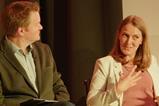Ruth Clemence reflects on a time when she wondered if the Bible could be trusted. For her, it led to a depressive cycle followed by anger, cynicism and disconnect from the Lord

It’s the oldest trick in the book. Did God really say…? The enemy of God craftily tempted Eve to do what God had forbidden (Genesis 3). Since the beginning, God’s people have been driven to doubt his words with devastating consequences.
We naturally have questions and we cannot always understand God’s ways. However, doubting what God says can lead us into dangerous waters if left unchallenged.
I found myself entangled in spiritual flotsam and jetsam recently.
I found myself entangled in spiritual flotsam and jetsam recently. A couple of conversations with different believers regarding strongly held beliefs about the Bible challenged me to the core. They appeared more intellectual and well-read than I; it left me feeling like I was sinking under the weight of my perceived ignorance. They seemed to know scripture well, argued their beliefs confidently, and used their intellectual prowess to run rings around me.
Questions bubbled in my mind: Can the Bible really be trusted? Do I need to know Greek and Hebrew to decipher its actual meaning? Does the Bible have authority and is it completely trustworthy? Was my faith weak enough to crumble because of a discussion? What would I do if someone attacked my faith and went in for the kill?
Does the Bible have authority and is it completely trustworthy?
A depressive cycle began soon after, followed by anger, cynicism, and disconnect from the Lord. I struggled to be in church and I was reluctant to study the Bible with others. It was a spiritually dark time and took several weeks to unpack what shook my faith in God so much. Would the anchor of my faith hold firm in this storm?
Whilst I struggled to hold on, a few close friends and family held me in prayer. As time went on, it felt like little had changed. Then one day I had a powerful experience in my doubt through an illustration I sketched. A few days later I had clarity and comfort as the Lord brought meaning to it. I realised more deeply that I could rest in him.
Thankfully, Jesus calmed the storm. He untangled my thoughts; it was like releasing a trapped sea creature caught in a net. Christ continued to be my anchor — holding me fast even when I felt like washed-up driftwood on a sandy shore. Remarkably, I returned to the Bible.
This faith-crisis resurrected hope in me. It taught me to remain steadfast in God’s word. Even this trial, like many others I have walked through, did not destroy my faith; it strengthened it. There are still unanswered questions, but I trust that God’s word is true. My finite understanding provided a gateway for greater dependence on Jesus.
Christians do have differences on what the Bible teaches, but we need to be mindful of how our opinions can affect others. We can agree to disagree well. Let’s learn to be sensitive to the Holy Spirit in our conversations. There is a time to reason together, but we need to be wise, humble and mindful of our words. It is not always right or necessary to win an argument, especially if it causes another to stumble in their faith. Our conversations are to be edifying as we seek to build up others. Ultimately, what we say matters, especially to God: ‘Let the words of my mouth and the meditation of my heart be acceptable in your sight’ (Psalm 19:14).
Read more on doubt
Deconstructing my faith is what saved it, we shouldn’t be afraid to start from scratch
Don’t feel ashamed if you experience doubt in your faith… it doesn’t have to be your dirty secret
Churches can do damage by silencing doubt and not addressing toxic behaviour - but there’s hope
The words of scripture are life-giving, thirst-quenching, soul-satisfying goodness. It is God speaking to us — his dearly loved children, reviving us with living water only he can give (John 7:37-38). I am thankful that God has given the Bible, which is his written instruction and love letter for his people. We should treasure it, meditate upon it, and live by it because we come to know our Saviour even more through it. The sword of the Spirit is the word of God (Ephesians 6:17). It is part of the armour we ‘put on’ to stand against the attacks from that ancient foe — the enemy of God. If we hear the whispers ‘did God really say…’ from the evil one, we can take up our sword, and resolutely and boldly declare, ‘yes he did!’



































No comments yet